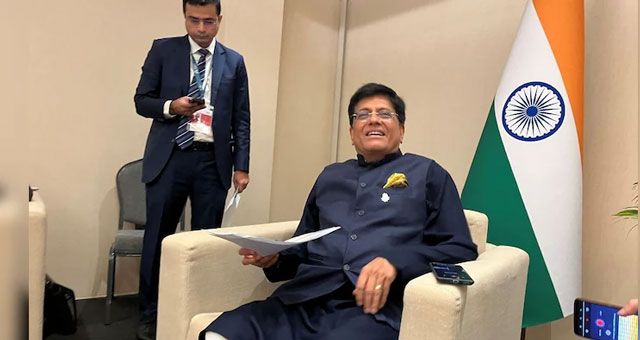Daijiworld Media Network- London
London, Jul 25: Indian Commerce Minister Piyush Goyal on Thursday expressed optimism that India and the United States will successfully reach a trade agreement before the looming August 1 deadline to avoid punitive tariffs of up to 26%.
Speaking to Bloomberg TV in London, Goyal said, “I'm always confident,” when asked about the prospects of a breakthrough in trade talks. He emphasised his strong working relationship with US officials, referring to US Commerce Secretary Howard Lutnick and US Trade Representative Jamieson Greer as “very dear friends.”

While acknowledging that both countries have been locked in negotiations for months, Goyal denied that there were any major sticking points in the current dialogue. He also clarified that contentious issues such as H-1B visas and broader immigration policies had not been part of this year’s trade talks.
Despite Goyal’s assurances, a few sensitive areas remain unresolved. The US has been pressing for broader access to India’s agricultural and dairy markets, while India is seeking relief from US tariffs, particularly on pharmaceutical exports and automobile components.
The urgency stems from President Donald Trump’s latest warning of secondary sanctions and elevated tariffs, especially against countries continuing oil imports from Russia—India among them. Trump has already finalized similar agreements with the Philippines, Japan, and Indonesia, putting additional pressure on New Delhi to seal a deal.
Meanwhile, Goyal accompanied Prime Minister Narendra Modi to the UK, where India signed a landmark Free Trade Agreement with Britain. The deal eliminates tariffs on key goods including cars and alcoholic beverages, marking a significant development in India’s global trade strategy.
“We have very robust negotiations going on with several countries,” Goyal said, naming the US, EU, New Zealand, Peru, and Chile among ongoing partners.
As the clock ticks toward the August 1 deadline, all eyes remain on Washington and New Delhi as they push to finalise terms that could reshape their bilateral trade relationship and prevent a new wave of tariffs.